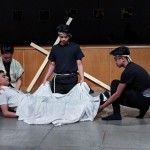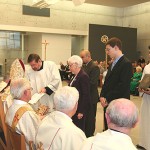I remember the year after my ordination we had another year of study. It focused on how to write a sermon. My classmates and I went out every weekend to help in neighbouring parishes but before we went our sermons had to be approved by our mentor priest. On Sunday afternoon when we all came home we would talk about how things went that morning or our experiences of hearing confessions on Saturday afternoons. This was our first experience of any kind of pastoral experience and it was an exciting for all of us.
These thoughts came to me reading the beginnings of today’s gospel when we hear of the excited apostles telling Jesus about all they done and taught. These were busy people; people were coming and going and wanting attention. Jesus and his friends had no leisure even to eat. Jesus suggested they all get away from their busyness and spent some time recharging their batteries.
That was not about to happen. A great crowd got there ahead of them and Jesus told the Apostles ‘we’ll have to save this for another time, right now we have to look after these good people.’ Jesus saw these men and women as ‘sheep without a shepherd’. He knew that their spiritual needs were not being looked after by most of their priests and spiritual leaders. The needs of these good people were not answered by priests and rabbis who didn’t have the time to listen to their stories and get to know them, priests who were more interested in proper rituals than the needs of these great unwashed.
Jesus knew these good people needed to hear again that God loved them, they were God’s people. These good people needed to hear they were of more value to God than any lilies of the field or birds of the air. He wanted to be for them a good shepherd, a good shepherd who knew each one by name. He would be the kind of shepherd who would search for them when they wandered away and bring them home. Jesus wanted to be so unlike the shepherds we heard about in our first reading, shepherds who ignored or abused their sheep, and shepherds who, by their abuse of power, turned their sheep away. By the way he took the time to be with these good people, to listen to their problems, to cure their pains, to tell them time and time again that they were precious to God Jesus wanted to set an example to those who would come after them as shepherds. He would be the shepherd who would lay down his life for his sheep.
Jesus is our good and faithful shepherd. Do we listen to his voice as he calls us to be shepherds to one another? Do we listen to his voice as it comes to us from men and women different from ourselves, different in faith, different in social backgrounds, different is cultural backgrounds, different in lifestyles? Do we hear Jesus’ voice as these good people ask for acceptance and respect? Are we willing, as Jesus was always willing, to accept people as they are, where they are in their life journey and walk with them on their journey? Are we willing as spouses to shepherd our spouses into a deeper mutual relationship, growing in love day by day. Do we shepherd our children to grow up free of bigotry and prejudice toward people who will into their lives. Are we willing to be shepherded by Jesus as he wishes to bring us to that closeness with him that we can say of ourselves, ’I live now, not I, but Christ lives and loves and serves through me.
As we continue to celebrate this Mass we pray for ourselves and one another that we be available to all those who come in need to us as Christ our shepherd is always available to us.
 Founded by St. Paul of the Cross, every Passionist takes a special vow to spend his or her energies in promoting remembrance of the sufferings of Jesus, the memory of the Cross, and reflection of the meaning of the Cross for the world.
Founded by St. Paul of the Cross, every Passionist takes a special vow to spend his or her energies in promoting remembrance of the sufferings of Jesus, the memory of the Cross, and reflection of the meaning of the Cross for the world.




